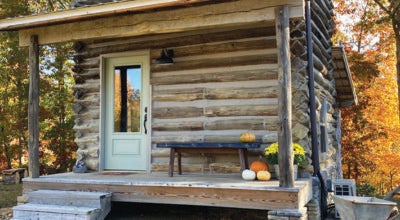Presidential Mothers: Lincoln’s dies young, step-mother a blessing
Published 1:10 pm Friday, February 3, 2023
|
Getting your Trinity Audio player ready...
|
By Betty Etchison West
For the Enterprise
Elizabeth Speer Buchanan, the mother of the 15th President of the United States, James Buchanan Jr., was born on March 17, 1767.
It is generally believed that Elizabeth’s father was James Speer and her mother was Mary Patterson Speer, but there seems to be some uncertainty about who Elizabeth’s parents were. It is believed that Elizabeth is of Scot-Irish descent. She was said to be intelligent and a deeply religious Presbyterian. Elizabeth Speer married James Buchanan, Sr. on April 16, 1788.
There also seems to be some disagreement about the number of children that were born to Elizabeth and James Buchanan Sr., but most sources say that they were the parents of 11 children. James Buchanan Jr. was the second child. He was born in a log cabin, but not because his parents were poor as were the parents of President Millard Fillmore. James’ parents, who finally moved to town, seemed to be the wealthiest residents of that town. James’ father was a successful merchant, and a real estate investor, in addition to being a farmer.
The cabin in which James Buchanan Jr. was born was later purchased by the Headmaster of Mercersburg Academy and moved to that campus. The cabin is not open to the public, but visitors are allowed to look in the windows.
James Buchanan Jr. was a graduate of Dickenson College in Carlisle, Pa., and he studied law in Lancaster, Pa. He served in the Pennsylvania State Legislature, in the U.S. House of Representatives, as Minister to Russia, in the U.S. Senate, as Secretary of State for President Polk, and as Minister to Great Britain before he became President.
It was believed that he would be a great president because of his prior experiences and successes, but for some reason that was not the case. He actually let the union fall apart around his feet which is hard to understand. He seemed to have inherited his mother’s intelligence, but for some reason he just could not seem to solve the problems that the United States faced in the late 1850s and early 1860s.
Elizabeth Speer Buchanan died on May 24, 1833, at the age of 66. She died 24 years before her son was inaugurated as President.
Would Mr. Buchanan have faced the country’s difficulties in 1857-1861 differently if his mother had been living?
James Buchanan’s mother, Elizabeth, is buried in Spring Grove Cemetery, Lemasters, Franklin County, Pa. Nine of Buchanan’s siblings are buried in that cemetery. President James Buchanan Jr. is buried in Woodward Hill Cemetery in Lancaster. That cemetery is in the town which James Buchanan called his hometown.
Lucy Hanks Lincoln
Little is really known about the family history of the mother of Abraham Lincoln. Her name was Nancy Hanks. The literature seems to indicate that Lucy Hanks had an illegitimate daughter that she named Nancy. Abraham Lincoln’s law partner said that Lincoln told him that his mother was an illegitimate child. The information that is available is that Nancy Hanks was born on Feb. 5, 1784. It seems that Nancy Hank’s genealogy is much less important than the kind of person that she grew up to be.
According to the literature available, Nancy was intelligent, and had a disposition that was cheerful and amiable. Another source says that she had a marked expression for melancholy.
Nancy Hanks married Thomas Lincoln on June 12, 1806. Nancy and Thomas had three children: Sarah, who was born on Feb. 10, 1807; Abraham, who was born on Feb. 12, 1809; and Thomas Jr. who died in infancy. The description of the personality of Nancy which is found in the previous paragraph could be used to describe the son of Nancy Hanks, who was named Abraham.
Abraham was intelligent. He had a great sense of humor and was amiable. He certainly had a marked expression for melancholy, which is what tends to stick in one’s mind when even looking at pictures of the man called Abraham Lincoln so one would have to decide that Abraham Lincoln inherited a great deal of his appearance and personality from his mother.
The following is a description of Lincoln’s early life which is found in my book, “Glimpses of the Presidents of the United States and Presidential Places”: “Lincoln learned to read, and he read everything he could get his hands on. When Abe was only 7 years old, his father, Thomas Lincoln, decided to move west. The family moved to Indiana, which at that time was the frontier where wild animals roamed. While in Indiana, the Lincoln family’s cow ate snakeroot plant which was poisonous. Abraham Lincoln’s mother, Nancy Hanks Lincoln, whom he adored, drank the milk, was poisoned, and died. Abe was distraught because he had lost the one person who really seemed to understand him and his desire to learn. Abe’s father just wanted his strong son to work and work hard—some kind of rift actually seemed to have developed between Abe and his father because he did not even go to his father’s funeral in later years.”
Nancy Hanks Lincoln was only 34 years old when she died. She is buried at what is now the Lincoln Boyhood National Memorial in Lincoln City, Ind.
About a year after his first wife’s death, Thomas Lincoln decided to go back east and find a wife. Thomas left his 9-year-old son and his 11-yeasr-old daughter to fend for themselves in that wilderness area where they lived. They had to subsist on nuts and berries was whatever else they could find. The children survived and Thomas’ decision to find a new wife proved to be a blessing for Abraham because the wife he found who seemed to understand his son, Abraham.
Thomas told the lady he married about his son’s love of reading because she brought books to Abe when she and her new husband returned to his home in Indiana. Lincoln always had kind words to say about his step-mother because she seemed to understand him much better than his own father.
One book quotes Abe as saying his step-mother, Sarah, “was a good and kind woman.” Sarah Lincoln is quoted as saying, “Abe was a good boy.” That is about as good an ending as there could be to a story concerning a step-parent.
In spite of all the hardships which Abraham Lincoln endured during his life, he became the 16th President and the man who saved the Union when the previous president seemed to do nothing to save the United States. Abraham Lincoln is rated at the top or near the top of all ratings of the Presidents by presidential scholars.





